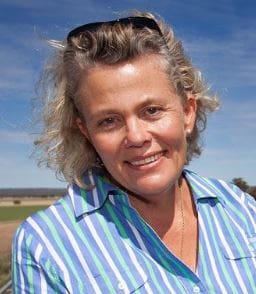THE SUPPLY chain which provides inputs to agriculture and markets its produce is not being impacted by COVID-19 lockdowns coming into effect across Australia.
A meeting yesterday between the heads of each Australian state and territory and Prime Minister Scott Morrison appears to have achieved consensus on this as border movements between jurisdictions tighten.
South Australia is to close its borders tomorrow at 4pm, and food and commercial supply chains are included in its list of exemptions.
The National Farmers Federation yesterday reiterated in discussions with the Federal Government the urgent need for agriculture and the food supply chain to be deemed an essential service during the COVID-19 response.
National Farmers Federation (NFF) president Fiona Simson said the organisation had been in discussions with the government about the “critical importance of a reliable food supply chain”.

Fiona Simson
“The NFF has been assured that agriculture and the food supply chain will not be interrupted, despite the closure of travel between some states,” she said.
“This is in line with the Prime Minister’s commitment to prioritising lives and livelihoods.
“The continued provision of quality fresh produce is paramount to safeguarding the wellbeing and health of the nation.
“Our state farming member organisations have been having similar conversations with their state governments.”
Ms Simson said the confirmation of agriculture as an essential service by the states and the Commonwealth as a collective would guarantee measures to control the spread of COVID-19 did not inadvertently obstruct food production and supply.
“The agriculture industry takes human health seriously and is taking appropriate measures to ensure this is a priority,” she said.
“That being said, the transport of produce from farm to market must be able to happen unobstructed – this includes across state borders.
“Likewise, for the logistics that ensure the flow of essential agricultural inputs such as fertiliser and crop protection products.
“Discussions also remain active about how to protect the workforce of key facilities such as abattoirs, should there be a positive COVID-19 test.
“We understand a list of essential services may be developed by states. It is absolutely critical that there is consistency across states in the recognition of the importance of food production and the supply chain.
“In our discussions with Government, the NFF has reiterated the farm sector’s commitment to playing its vital role in ensuring Australians continue to have access to the quality, fresh groceries they depend on in these uncertain and challenging times.”
Organic support
Organic industry body, Australian Organic, has joined the NFF in making an urgent call for agriculture and the food supply chain to be deemed an ‘essential service’ for the purpose of the COVID-19 response.
“As a member of the NFF, we have been in weekly meetings with them to support focus in the agricultural area, and now more than ever given the current crisis, will continue to back them,” Australian Organic chief executive officer, Niki Ford, said.
“The NFF is committed to ensuring modern farming is not only viable and sustainable but continues its vital and growing contribution to the nation despite any challenging circumstances. The organic agricultural sector makes up a significant portion of the industry, and we will be endeavouring to make sure the needs of organic growers are met during these difficult times.”
There are currently more than 2000 certified organic primary producers in Australia including farmers, graziers, apiarists and wild harvesters.
Maintaining the flow
GrainGrowers chair, Brett Hosking, said grain farmers were keen to ensure agriculture was listed as an essential industry under the special conditions being brought in to deal with the COVID-19 crisis.

Brett Hosking
“That seems to be consistent with the rhetoric that is coming out of the Federal and State governments who have spoken so far which is really encouraging for the simple reason that we have done a really good job of ensuring there is food on supermarket shelves,” he said.
“If we have threats to our supply chains and inputs, such as chemical, fertiliser, labour and water, then the food on supermarket shelves becomes jeopardised.
“Ensuring our supply chains remain open and active is really important. That covers a heap of areas, whether it is our local Nutrien or Elders branch, machinery dealers, fuel and fertiliser suppliers.
“It is really important to maintain the flow of freight and the cyclical agricultural economy.”
Mr Hosking said rural areas were slightly more protected from the virus spread through their isolation and geography, but he still encouraged growers to take special precautions.
“It is a nasty bug and the last thing anybody wants in the middle of a busy seeding period is to be struck down with it. It can be avoided by better hygiene. So, some soap and water in the paddock or sanitiser, and a wipe down of the tractor won’t go astray for once,” he said.
New ag officer
Meanwhile, Minister for Agriculture, Drought and Emergency Management David Littleproud today announced the appointment of Mark Tucker as senior agriculture industry engagement officer to maintain agricultural production and supply chains through the COVID-19 response.
“Mr Tucker will be the key liaison between my department and agriculture, fisheries and forestry stakeholders affected by COVID-19,” Mr Littleproud said.
“He understands the ag sector through-and-through from his distinguished career working closely with this industry’s stakeholders and peak bodies.
“From tomorrow, he’ll be working with Commonwealth Departments and State Governments to ensure agriculture industry perspectives inform our decision-making.
“This role will give us regular status updates on key issues in this sector and it’ll help us respond exactly where we need to.”
Sources: Government of South Australia, NFF, Australian Organic, GrainGrowers, Minister for Agriculture
Grain Central: Get our free daily cropping news straight to your inbox – Click here

HAVE YOUR SAY